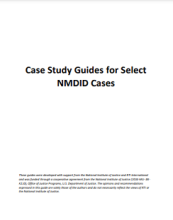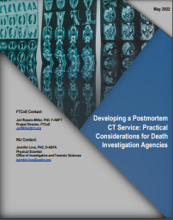New Mexico
NMDID: A New Research Resource for Biological Anthropology
Research From Records: Retrieving and Sharing Useful Data From a Non-research Database
Replication Validation of a Human Trafficking Screening Tool for Law Enforcement and Estimation of Prevalence
Identifying the Scope and Context of Missing and Murdered Indigenous Persons (MMIP) in New Mexico and Improving MMIP Data Collection, Analysis, and Reporting
Postmortem CT Scans: Can They Effectively Replace Full Autopsies?
Developing a Postmortem CT Service: Practical Considerations for Death Investigation
Appropriate and Effective Use of Security Technologies in U.S. Schools: A Guide for Schools and Law Enforcement Agencies (Sensitive Version)
Technology: Past, Present and Future
Evaluation of the Routine Use of CT Scanning to Supplant or Supplement Autopsy in a High-Volume Medical Examiner's Office
Booker and Beyond Analyzing Sentencing Reform and Exploring New Research Directions
This webinar features a discussion of previously published research on the U.S. Supreme Court’s 2005 Booker decision - which effectively transformed the United States Sentencing Guidelines from a mandatory, to an advisory, system. The presentation will address selected research findings from the last 15 years. Individual participants will briefly review their previous research findings with particular attention paid to the analytic methods used.
See the YouTube Terms of Service and Google Privacy Policy
Developing the Minimum Dataset for the New Mexico Decedent Image Database
Improving identification of unknown American Indians and Hispanic/Latinx Americans
Facilitating Forensic Research in Multiple Fields Using a Unique Computed Tomography Dataset
A new postmortem image database will be a resource for research in forensic anthropology, pathology, and radiology.





